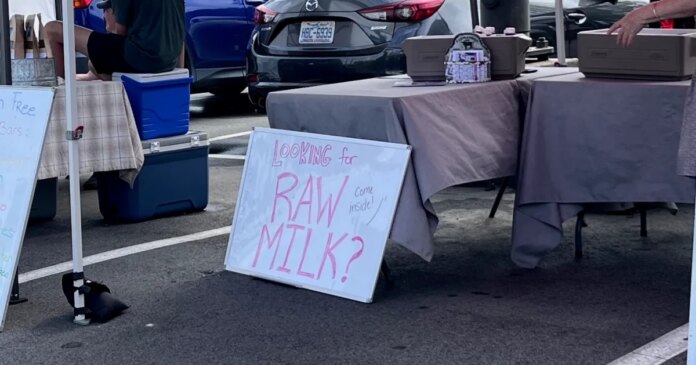After receiving hundreds of phone calls and emails from raw milk drinkers and producers over the past week, North Carolina state senators scaled back a ban on sales that had been included in their annual Farm Act.
During a Senate Judiciary Committee meeting Tueday, Sen. Brent Jackson, a Sampson County Republican, introduced an amendment that would let people keep purchasing raw milk as part of herdshares. Those are agreements where consumers who buy a portion of an animal are then able to buy its milk.
At the same time, Jackson moved to close a loophole allowing raw milk sales that were theoretically for pets. N.C. Agriculture Commissioner Steve Troxler previously said that it is an open secret that people buying raw milk that way are drinking it.
“I still contend this is very dangerous stuff if it’s not handled property. It’s like playing Russian Roulette if it is not handled properly. And that was part of our concern. It was a public safety issue and I still believe it is,” Jackson told WUNC.
Jackson also noted the dozens of raw milk supporters who packed a legislative committee room Tuesday, with an overflow crowd lining both sides of the hallway outside.
Raw milk support
Sen. Sophia Chitlik, a Democrat from Durham, said her family joined a herdshare offering raw milk when her son was a year old.
“I learned that very scary diseases like tuberculosis, (bacteria), E. coli could indeed be passed through raw milk if safety standards weren’t followed or testing wasn’t done,” Chitlik said, adding that the herdshare her family entered was with a farmer in Rougemont who tests their cattle regularly and follows strict safety standards.
Robert Benor, who offers a herdshare at his Cedar Grove farm, chastised lawmakers for not reaching out to raw milk producers in the state before introducing the ban in the Farm Act. That would have shut down his business, he said during the Judiciary Committee meeting.
“I understand there’s a lot of emotion. I understand there’s science on both sides. But I think if you show up to the farms and you see the care we put towards our animals, our land, our community and the milk itself, all of your fears would be assuaged,” Benor said.
Herdshares, which Benor’s website compares to a co-op membership, were enabled under the 2018 Farm Act.
Lingering health concerns
Troxler has been a persistent critic of raw milk. He argues that not pasteurizing milk increases the likelihood that people will ingest dangerous bacteria like listeria or E. coli.
The discovery of live bird flu virus in raw milk brought more urgency to the issue, Troxler told lawmakers during a committee meeting last week, with cats contracting the disease after drinking raw milk and subsequently dying. Cows in at least one dairy herd in North Carolina has contracted bird flu after cows that had the disease were integrated into it from Texas.
Jackson agreed with that concern, which is why part of why the Farm Act would still enact a ban on raw milk sales for pets.
“This is all still a very big concern with the Avian flu that’s been going around,” Jackson said.
A separate amendment introduced Tuesday directed the Agriculture and Forestry Awareness Study Commission to study retail sales and herdshare agreements. It directs the commission to seek input from the N.C. Department of Agriculture, raw milk advocates and dairy farmers, among others.
Studying raw milk will better allow the General Assembly to understand how many people are drinking raw milk in the state and what safety measures producers are taking.
“Supposedly they’re doing all that and I just think this would be a good way to help them, help that industry, as well as help the rest of the state understand what they’re doing with raw milk,” Jackson said.
